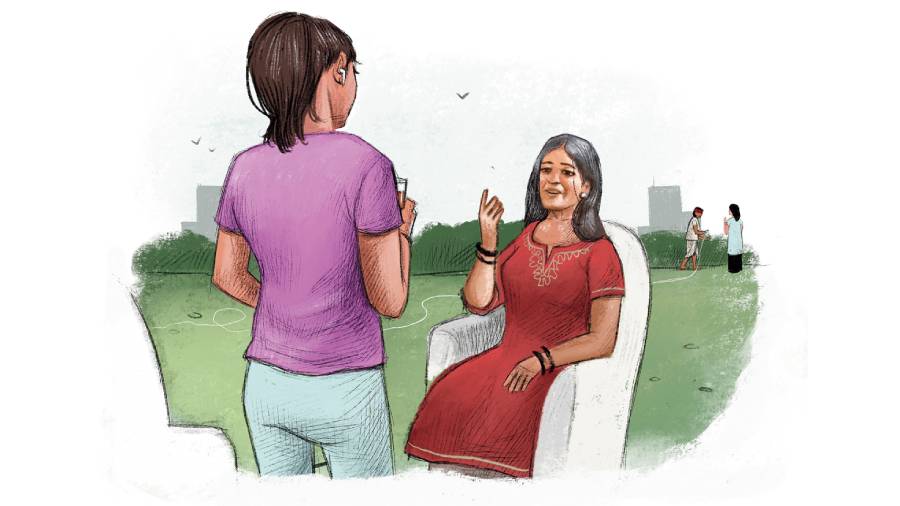Recap: Everyone, barring Zaara, is happy that the usually withdrawn Seher seems to be opening up to Saahil and a romance is blooming.
“This house hasn’t seen romance in a long time,” Aparna sighed, with a smile. She touched Zaara’s chin with her freshly manicured hands. “You’re next, sweetie.”
“Absolutely not,” Zaara shook her head firmly, then looked up at the balcony. “And I don’t consider that romance.”
Raahi sighed and busied herself with directing the gardener. She had heard this all before.
“What do you consider romance then?” Aparna asked, a little amused by the young girl’s contempt.
“It isn’t talking about books all day!” Zaara set her cold coffee down, meaning business. “Or work or philosophy or the news either. Romance can’t be just talk. Shouldn’t there be some... some passion? They should be so into each other that they can barely breathe around each other.” Then in apparent exasperation, she added “Those two, they breathe too easily.”
Aparna smiled. “Would you rather they suffocate?”
Raahi, who was by the bougainvillea, let out a laugh. Aparna could be funny, who knew?
Zaara looked up again at the balcony where her sister and Saahil had put on a blues jazz melody. It’s lilting notes wafted into the garden, where the crickets had begun to chirp. But atmospheric as the evening was, Zaara still frowned and shook her head, completely dissatisfied with the dynamic.
“Just because they’re good friends doesn’t mean that they’re in love,” Zaara said, definitively. “I’d rather have nothing than some pale imitation of romance.”
She picked up her glass of cold almond milk and took a big gulp.
“What you’re describing isn’t love sweetie,” Aparna said, wiping the froth off the girl’s chin. “It’s infatuation. It doesn’t last for longer than a year, at best.”
“It does,” Zaara insisted, “Not everyone is lucky enough to find passionately lasting love, but it does exist. And it does last. Just look at Mom and Dad…”
As Aparna’s expression froze, the 22-year-old broke off immediately, realising her faux pas.
The garden fell eerily silent. Seher and Saahil’s banter from the balcony became so audible that it was awkward. The music from their balcony only underscored the tension between the three of them. A tension so palpable that even Baburam seemed to pick up on it and put his spade down, confused.
Raahi, acting quickly, decided that the gardener had heard enough of their personal dramas for the day. “Baburam,” she instructed in Hindi, “It’s getting late. Come back tomorrow. We’ll finish potting the saplings then.”
But Aparna had decided at the second turn of the tune, not to take offense. Her hurt mind had begun to heal with the Pandits in her home. For the first time in a decade, Aparna had spent 48 hours without a drop of liquor, and the constant and delightful companionship of the Pandit girls hadn’t allowed her to miss it yet.
They brought her coffee in the mornings and flowers in the evenings. They asked about her childhood. They asked about her interests. They asked for her opinions on the news of the day.
It had been years since anyone had taken such an interest in her.
And they did it without an agenda. Not once had Maahir’s will been brought up by the Pandits. Aparna had prepared herself, before they arrived in Bombay, to answer some unpleasant questions about the inheritance she had received from her late husband, but it had been unnecessary. Neither Raahi nor her daughters seemed to believe they had any right to Aparna, or Azaan’s wealth from Maahir. They seemed to be resigned to their fate and trying to live with as much dignity within their new circumstances as possible.
Aparna had come to realise over the past two days that the Pandits weren’t Macchiavelian vamps like Lali Rajat had been. They were simply affectionate women who had been devoted to Maahir and then forgotten by him.
Just like her.
“Wait Baburam,” Aparna stopped the gardener who had begun to pack away his tools. “Let’s plant one shrub this evening at least.”
“Are you sure?” Raahi asked, with a swift glance at Zaara, who looked red-faced with remorse.
“Yes,” Aparna said, and kissed Zaara’s flushed cheek in forgiveness. “Doll, fetch that bigg-ish plant.”
Zaara rushed to lift the large sapling, soiling her fair hands perhaps for the first time since mud pies in pre-school. She felt so guilty of hurting her new friend that if Aparna had asked her to marry unimpressive Saahil herself at that moment, she would have considered it.
The gardener quickly took the jasmine plant with its few white flowers from her before she dropped it. He lowered it into the hole he had dug out for this purpose. Raahi picked up his shovel and heaped some soil on it. As the mud particles and pebbles rained down on the roots, she let out a satisfied breath, and heaped another bit of soil, as though burying a ghost. Aparna bent down and padded the earth a few times, laying it all to rest.
Then both women rose and looked at each other in the silent acknowledgement of having lived, weathered and survived. Zaara took her AirPods out as a sign of respect.
“Well done girls,” Aparna said with a smile as she turned towards the house. “We’ll leave the windows open during dinner tonight. Let raat ki rani scent our meal.”
***
“Hello, is that Mr Rajesh Bhatia?” a sweet voice crooned.
“Yes, speaking.” Bhatia was intrigued. He had heard this voice before… but it was older now. More assured.
‘This is Sangita Pratap Singh. Aparna’s sister.”
The lawyer sat up straight, feeling very important. This was the first time Justice Patil’s younger daughter had deigned to call him since she had become Jai Pratap Singh’s wife.
“How can I help you, Sangita-ji?”
“I just phoned my sister,
Mr Bhatia, but she appears to be out again. With her guests.”
Bhatia made no response. He wasn’t happy about the situation himself.
“They’ve gone to the jewellers this time,” Sangita continued, in her bell-like tone. “Hopefully, not to buy diamonds at my sister’s expense. But then, once you invite gold-diggers into your home, anything is possible.”
“I tried advising against it ma’am. But Aparna was beyond persuasion.”
“Clearly my sister is not in her right mind Bhatia saab. I suppose you already know about her... affliction?”
Bhatia cleared his throat. He didn’t like to speak ill of Aparna. She had been through so much. And partially, due to his abetment of Maahir in his many affairs.
“Yes,” he managed finally. “I am well aware of her er… situation.”
“Then you realise that she is in a vulnerable position. Something must be done to get those women out of the house before they can take any further advantage of her.”
“I tried speaking to Azaan,” Bhatia pointed out, “but he is too busy with work at the moment to take notice.”
“Then make him take notice!”
Bhatia was surprised. The syrupy voice had turned shrill in an instant. He could hear Sangita take a deep breath on the other end of the phone, recomposing herself.
“I can’t have my sister seen swanning around Bombay’s salons with her husband’s mistress,
Mr Bhatia,” she said. “And I can’t have my son living in the same house as those women either. I want the Pandits out of the picture before they turn us all into a laughing stock.”
Bhatia waited for her breathing to normalise. Then he spoke, clearly, and with authority.
“I understand Sangita-ji. I am in complete agreement with you.”
There was an exhalation of relief on the other end of the phone. And the sound of a glass being picked up. Bhatia listened patiently as Sangita Pratap Singh glugged her water. Then with a tinkle of her bangles, the glass was put down.
“Please do whatever is required to get the Pandits out of Kumar Mansion,” she said. “And send your invoice to my husband’s office.”
“That won’t be necessary ma’am,” he said. “I consider myself a friend of the family.”
“Very well.” But there was an unmistakable note of appreciation in her voice.
Bhatia put the phone down and began devising a method… distasteful but effective… to safeguard his late mentor’s vulnerable elder daughter.
(To be continued)

Riva Razdan is a New York University graduate and currently working as a screenwriter and author based in Mumbai. Her debut novel Arzu was published by Hachette India in 2021











